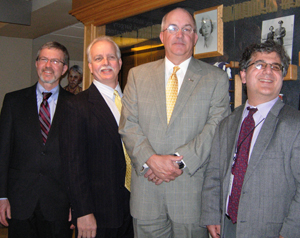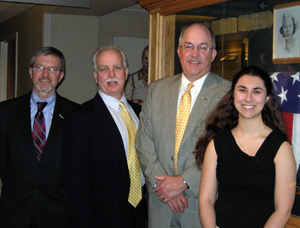 |
Stephen Bonasera, M.D., Ph.D., far right, with Oldfield Family Foundation trustees, from left, Patrick Grewe, Doug Carlo and Jake Strasheim. |
 |
Natalie Manley, far right, with Oldfield Family Foundation trustees, from left, Patrick Grewe, Doug Carlo and Jake Strasheim. |
He’s tested his theory in mice and now will study human behavior to help him evaluate clinical therapies for Alzheimer’s disease and other neurodegenerative processes.
Dr. Bonasera recently received the 11th annual Vada Kinman Oldfield Alzheimer’s Research Fund Award to support his novel research on the disease, which affects 5.3 million Americans.
The late Col. Barney Oldfield established the award in honor of his wife, who battled Alzheimer’s for 11 years.
When individuals are healthy and fit, no matter what their age, they have a large life space, said Dr. Bonasera, who joined UNMC this past November as an assistant professor in the section of geriatrics and gerontology in the department of internal medicine. As people age, their geographic expanse shrinks and their behavior patterns change. People begin to eliminate long trips, cut back on neighborhood travels and reduce their in-house activity level and movements.
Those clues may signal a larger health issue and are more reliable than self- or caregiver-status reports, he said.
“If we can detect behavior changes before they get to the doctor’s office, we have a powerful clinical tool to determine therapeutic responses, as well as behaviors that might be warnings of depression and bipolar disorder,” Dr. Bonasera said.
Dr. Bonasera will use the $10,000 Oldfield award stipend to measure an individual’s activity level — at home and in the community — via wireless network technologies, such as global positioning systems and Bluetooth beacons, cell phones and watches.
“If a person’s TV is on and there is no movement, we’ll infer they’re sleeping or watching TV,” he said. “If the microwave is on, we’ll infer they’re making dinner.”
Also, UNMC medicine and public health student Natalie Manley received the fifth annual Nancy and Ronald Reagan Alzheimer’s Scholarship Fund Award. The Omahan became interested in Alzheimer’s disease thanks to a high school research paper.
“Alzheimer’s hurts everyone around the person with dementia,” she said. “We want to take the best basic science into rural Nebraska and improve lives.”
|
|
Manley will work with the Nebraska Geriatric Education Center and Matthew Timm, M.D., in Pender, Neb., to ask three questions on interdisciplinary rural team care:
- What are the essential evaluation tools?
- What are the barriers to implementation?
- How does the team utilize community resources?
The answers will help Manley develop a model for interdisciplinary evaluation of complex geriatric patients in rural communities.
The Kinman-Oldfield Family Foundation established the Reagan award to honor the late president, who battled Alzheimer’s for 10 years. Oldfield met Reagan in 1939 and later became his publicist. The award recognizes scientists for promising research into Alzheimer’s disease and comes with a $5,000 stipend.